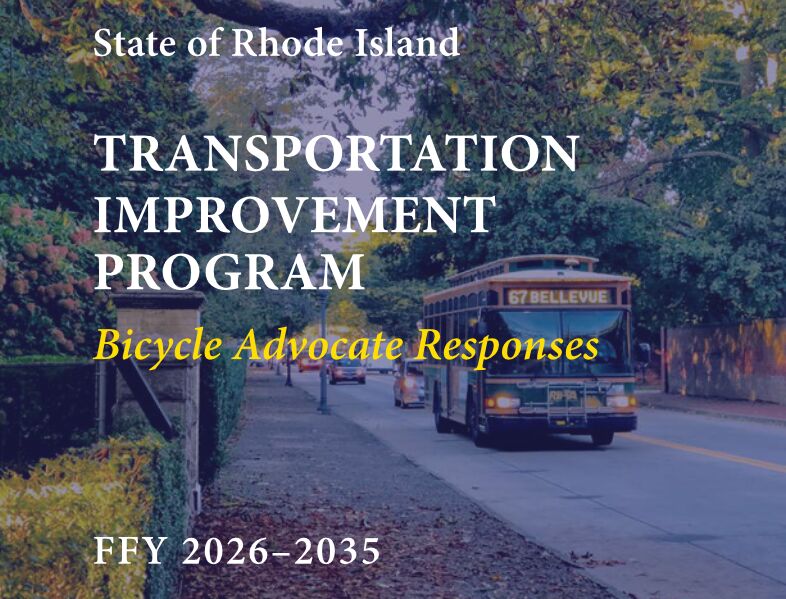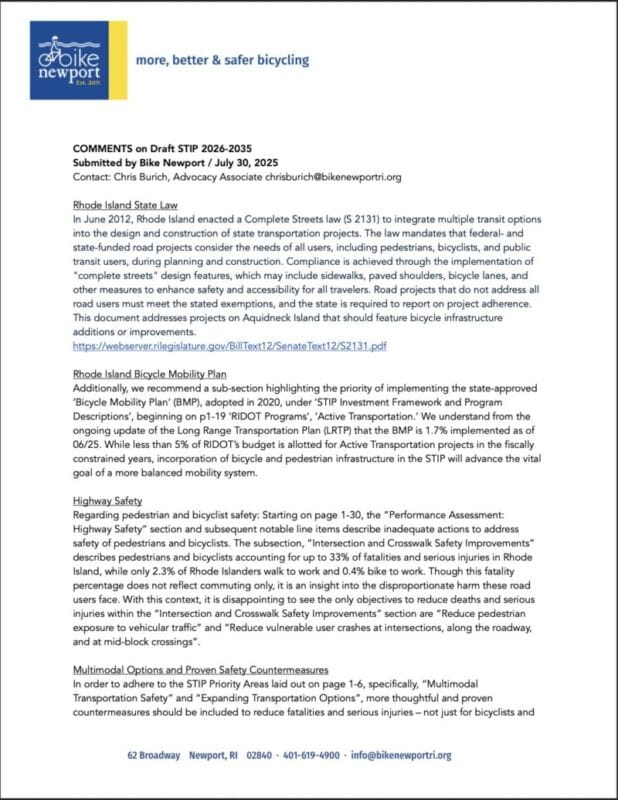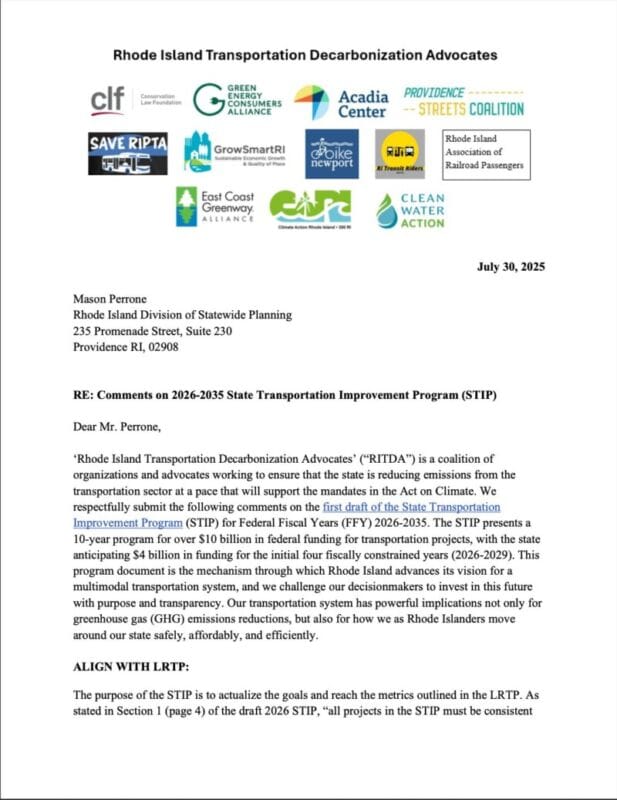
Previously, we advised you how to review and submit comments on the Draft 2026-2035 RI State Transportation Improvement Plan (STIP). Now that the public submission period has ended, we are sharing what organizations across the state have submitted. If you have additional advocate submissions to share, please email the document to chrisburich@bikenewportri.org.
Bike Newport Comments
Key Points: *
- Compliance gap: Rhode Island’s 2012 Complete Streets law requires consideration of all road users, but major STIP projects lack required bicycle infrastructure despite adequate road width.
- Safety crisis: Pedestrians and cyclists represent 33% of traffic fatalities but only 2.7% of commuters combined, showing disproportionate vulnerability.
- Implementation failure: The state’s official Bicycle Mobility Plan is only 1.7% complete after 5 years, with under 5% of transportation budget allocated to active transportation.
- Specific missed opportunities: $70+ million in Aquidneck Island road projects (Bellevue Ave, Valley Road, others) identified as priority bike routes in local plans but do not specify bicycle improvements.
- Proven solutions ignored: Document cites specific FHWA safety countermeasures like bicycle lanes and road diets that could reduce fatalities but aren’t being implemented.
Rhode Island Transportation Decarbonization Advocates
Key Points: *
- Funding misalignment: Despite claims of following the Long Range Transportation Plan, only 7% of the $10 billion program goes to “Expanding Transportation Options” and 6% to “Multimodal Transportation Safety,” while 84% funds “Asset Management.”
- Lack of transparency: The state provides no public information about how transportation projects are selected, prioritized, or weighted, creating an “opaque, imbalanced internal process” that undermines accountability.
- Missing climate analysis: RIDOT received $100,000 specifically to model emissions impacts of STIP projects but failed to include this federally-funded analysis in the plan, despite Act on Climate mandates.
- Implementation crisis: State-approved plans show dismal progress with the Bicycle Mobility Plan only 1.7% implemented after 5 years, while less than 5% of RIDOT’s budget supports Active Transportation projects.
- Specific transit investments needed: Coalition recommends flexing federal highway funds to RIPTA, adding dedicated bus lanes and HOV lanes (including on the $427M Washington Bridge rebuild), and expanding rail electrification to reduce vehicle miles traveled.
Attorney General Peter Neronha
Attorney General Peter Neronha recently submitted a comment letter to the Rhode Island Division of Statewide Planning urging the Division to revise deficiencies in its Draft State Transportation Improvement Plan (STIP) in order to meaningfully contribute towards compliance with the State’s Act on Climate.
“The Act on Climate isn’t optional, it’s the law,” said Attorney General Neronha. “And right now, state leaders continue to fail to take meaningful steps towards fulfilling our obligations to the goals set forth in the Act on Climate, thereby failing our residents and our environment. The progress we make within the transportation sector is of the utmost importance because transportation accounts for nearly 40% of Rhode Island’s greenhouse gas emissions. That said, the current draft of this Plan does not go far enough, not by a long shot.
The comment contains the following recommendations:
- Future Draft STIPs should anticipate and reflect the most up-to-date Long Range Transportation Plan.
- The Draft STIP should incorporate a greater number of projects that meaningfully reduce emissions and vehicle miles traveled.
- The Draft STIP fails to take concrete and meaningful steps to invest in the reduction of vehicle miles traveled and transportation emissions.
- The STIP should identify the emission reduction potential of projects in the project tables.
- The Draft STIP should aim to identify means for fully funding regionally significant projects that promote public transportation and alternative modes of transit.
To read the full comment letter, please visit the Rhode Island Attorney General’s website.
Jim Fry (Individual)
Key Points:
- Network connectivity impact: Without bicycle infrastructure on key state roads like Bellevue Avenue and Memorial Boulevard, Newport’s planned commuter bike loop connecting to Middletown cannot be completed, potentially cutting off future cyclists from a developing network.
- Disconnect from local planning: The STIP operates separately from Newport’s adopted transportation plan “Keep Newport Moving,” which specifically addresses the city’s bicycle and pedestrian safety needs with detailed timelines.
- Major infrastructure opportunity missed: The $31 million Bellevue Avenue ADA project could easily accommodate bicycle lanes on the southern end, which is wide enough for dedicated bike facilities without major infrastructure changes.
- Vague multimodal commitments: Memorial Boulevard improvements promise only “better accommodations and connections” without specific bicycle infrastructure, despite the city’s master plan calling for innovative separated bike facilities within 2-5 years.
- Timing misalignment: Broadway streetscape improvements are scheduled for 2033, creating a decade-long delay for safety improvements in an area that has experienced recent injuries and a pedestrian fatality.
* Key points were generated with AI assistance.




 Bike Newport
Bike Newport